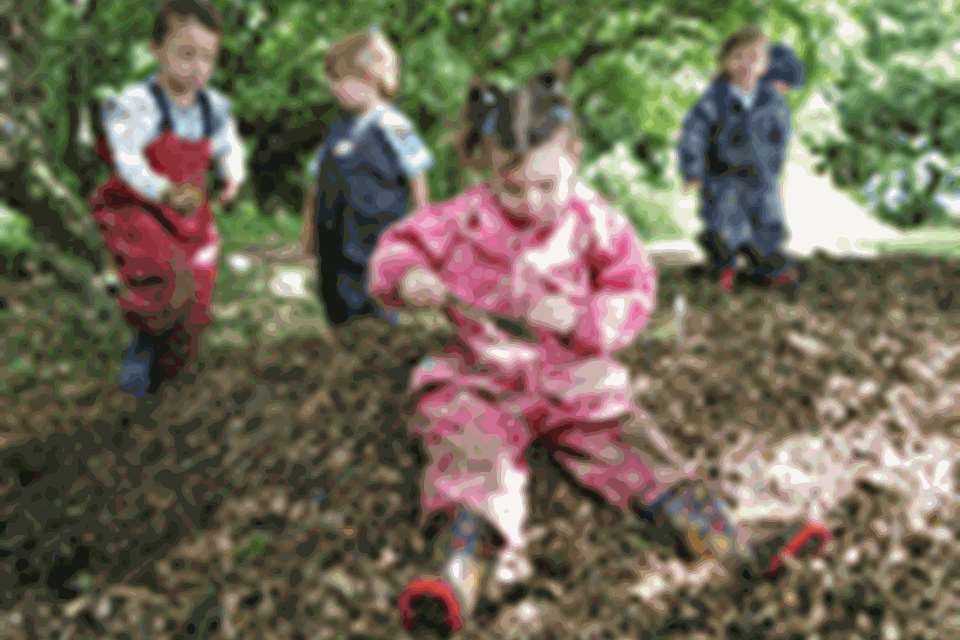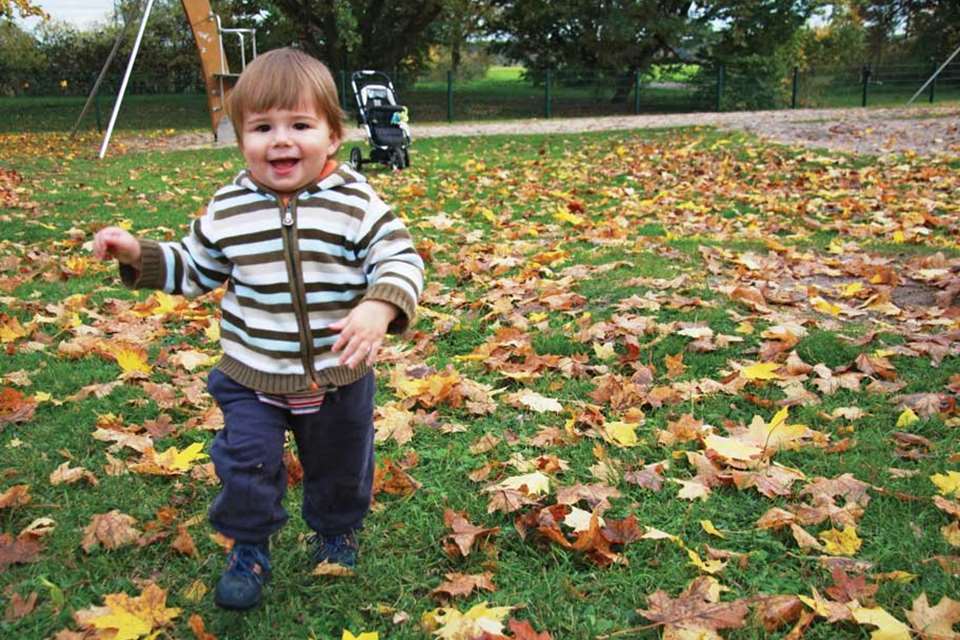Positive Relationships: Well-Being - Set for life
Monday, November 2, 2015
The London Early Years Foundation is tackling obesity by creating a model of excellence - encompassing not only child health, but the attitudes of staff and parents. June O'Sullivan explains

The basis of a good organisation is one that is always alert to changes in the wider environment and finds ways to respond. Of course, that is easier said than done! At the London Early Years Foundation (LEYF), we have become more and more aware of child obesity and how we might help mitigate this problem.
The statistics are scary, with almost a quarter of British children overweight by the time they start primary school, and while obesity is highest among older children, about 11.2 per cent of four- to five-year-olds are obese, with a 40 to 70 per cent chance they will become obese adults. Diet-related ill-health costs the NHS £5.8bn annually, with childhood obesity-related illnesses such as asthma in England costing £51m per year.
Nurseries are one of the first places where the consequences of wider socioeconomic problems are felt – the implications of poor nutrition on the long-term health and welfare of our children being one of them. If you don’t believe me, consider the work of Margaret McMillan.
Given the scale of the child obesity problem and the potential for it to worsen, we decided that we needed to create our own response. However, as we started to investigate, we felt overwhelmed by the amount of small projects, initiatives and disconnected snippets of information about nutrition, food portions, salt and sugar and five a day.
We were not surprised by the confusion many parents expressed when we talked to them about food and healthy living. After some deep thought and in conjunction with staff, we realised what we needed was a model for excellence in childcare nutrition, exercise and active lifestyle, because addressing one issue in isolation would be insufficient. We also decided that it would be beneficial if we developed a strategy that could be replicated in other nursery settings and lead to behavioural change in chefs, staff and parents.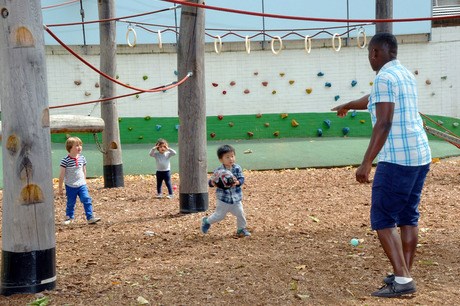
LEYF’S FOOD REVIEW
One way to embed a culture of healthy food is to train those who cook. When we started our journey a few years ago, I was surprised to find there was no specific occupational standards for chefs working with children under eight years.
We addressed this by writing the National Occupational Standards with the help and advice of local authority dieticians, nutritionists and food experts and a strong backing from across the sector from, for example, the Children’s Food Trust, the Pre-School Learning Alliance, Toad Hall Nursery Group, Grub 4 Life and the Infant & Toddler Forum.
The result is the Food Procurement and Cooking for Early Years Level 2, accredited by CACHE. The qualification is designed to help chefs cook from a child’s point of view, including procuring the right foods, serving the right portions and presenting dishes in an attractive way.
The Standards are also designed to strengthen the role chefs play in educating staff and parents and influencing children to become healthy and informed foodies. Early years chefs are not just someone in a kitchen, but increasingly a crucial member of a team working to ensure children are safe, fit and healthy.
While this is a more long-term action, we also looked at improving our immediate service. We engaged the LEYF chefs and designed our approach based on the often-quoted piece of wisdom ‘Tell me and I forget, teach me and I may remember, involve me and I learn.’
With the chefs’ help we have standardised our menus so the food in all nurseries is balanced and we have a shared LEYF cookbook, including tips for parents. We wanted to do this to ensure consistency when chefs were absent and we had to rely on agency cover. While doing this, we reviewed our suppliers to make sure we could get the freshest and best quality food while limiting our carbon footprint.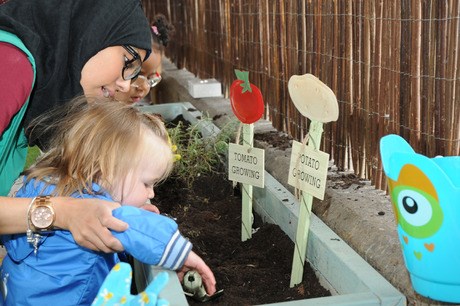
LEYF PEDAGOGY
LEYF has developed a research-based pedagogy, taking the best elements of local and international research. The area most relevant to this approach is what we label ‘safe, fit and healthy’. We thought about how we engage the children in keeping themselves healthy and fit and influence their parents.
Research used by OMEP to encourage handwashing found that getting the children to champion the new behaviour was very effective. We wanted to work in such a way that our children would champion healthy lifestyles at home.
One of the LEYF ways of engaging parents is through our pedagogical conversations, where we use conversation to extend parents’ knowledge about their children’s learning and development needs. We reinforce this with parents’ information, workshops, open days and home learning bags, but with more than 3,300 families attending LEYF nurseries we have long learned that we need a range of approaches if we are to fully engage parents.
Like all nurseries, we organise regular activities for the children to investigate the food cycle from seed to a meal. We have an Urban Outdoors approach, which focuses on how we use the outdoors as a major stimulus of learning.
We place a big emphasis on mealtimes, ensuring that they are a very calm and social experience. Staff eat with the children, talk to the children about the food and help them to understand more about it as they are encouraged to serve themselves, try different tastes and learn the basis of good table manners.
Chefs also lead a learning activity at least once a month, which the children take very seriously as they see the chef as the food expert. The chef also does a monthly planning meeting with the children to ascertain what food they are enjoying and what they would like to see on the menu.
Contrary to popular restaurant practice, it is rare that children ask for chicken nuggets and chips. Generally, when they are exposed to proper food they are braver and broader, and favourites include tarragon chicken, stuffed baked potatoes and mackerel pâté on toast as well as the perennial favourite garlic bread.
All nurseries have fresh vegetables in the role-play area so children can familiarise themselves with interesting vegetables like sweet potato, parsnips and celeriac. Not all LEYF nurseries have well-appointed gardens to grow an abundance of fruit and vegetables, but we can all grow herbs and visit the local London greengrocers and markets. This has many benefits, including walking around the local neighbourhood.
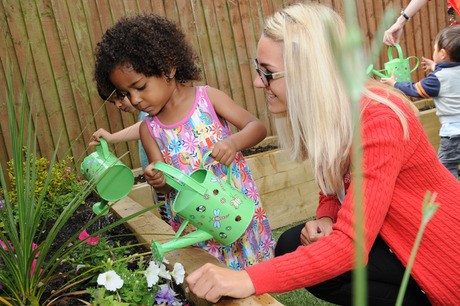
Helping children to be fit is about more than what they eat. Their susceptibility to obesity is aggravated by sedentary lifestyles and parents’ fear of letting them play outdoors. Some 90 per cent of two- to four-year-olds don’t experience enough physical activity, even though it’s a Prime area of development in the Early Years Foundation Stage.
For babies, movement and physical activity is crucial to long-term learning and development. We therefore wanted to examine ways of ensuring that we got staff to understand their role in extending the children’s physical development.
We aim to ensure that children are given opportunities for: playing on their backs; moving around on their tummies; crawling; rolling; tumbling; rocking; sliding; swinging; spinning; dancing; balancing; and digging.
STAFF FITNESS
 Of course, we need to consider the health and fitness of early years staff too. It is a mixed picture, so part of our strategy was to raise staff awareness of their own fitness, health and personal attitudes to food. We decided to take two approaches. Firstly, we linked with Dr Lala Manners from Active Matters and many of our staff attend her CACHE Level 3 Physical Development course.
Of course, we need to consider the health and fitness of early years staff too. It is a mixed picture, so part of our strategy was to raise staff awareness of their own fitness, health and personal attitudes to food. We decided to take two approaches. Firstly, we linked with Dr Lala Manners from Active Matters and many of our staff attend her CACHE Level 3 Physical Development course.
In addition, we continue to liaise with Linda Baston-Pitt from the Old School House Nursery near Cambridge as she has done much to promote health living in her setting (see box) and developed the Physical Activity and Nutrition Co-ordinator (PANCO) programme with a view to replicating this across LEYF.
We are also in early discussions with Active Movement’s Dr Mike Loosemore, who has developed a means of helping adults make minor adjustments to their daily lives that increase their fitness.
We will continue to research ways to improve the health of LEYF children in partnership with staff, parents and professionals. Our aim is to mitigate the risk of obesity in small children, by ensuring that their parents and carers (staff) are better informed. This will remain a key part of our strategy as we take on new nurseries and staff.
have long believed nurseries are much more important to the fabric of society than they are given credit for. How we help raise the issue of obesity and find ways to address it right at the beginning is crucial. As ever, when the sector joins together with one voice we have more influence and we urge that we all consider the powerful trio: safe, fit and healthy. n
June O’Sullivan is chief executive of LEYF, www.leyf.org.uk
DOING WELL: SUPPORTING STAFF
It’s time to make staff well-being a priority, says Linda Baston-Pitt of The Old School House Nursery

Well-being is seen as central to a child’s capacity to enjoy a healthy and fulfilling life, with positive relationships and the dispositions to embrace learning. But if we are to create early years environments in which children flourish, then we also need to support the well-being of early years staff.
Within the field of early years education, it is evident that an integrated approach to well-being is required. A growing body of research has created a positive shift, which highlights not only the challenges but also the importance of establishing health promoting behaviours during early years.
There has been a growing number of targeted physical activity and healthy eating interventions in early years In response to the obesity crisis, but many programmes have focused on negative aspects rather than positives.
Our goal was to develop a more positive approach to problem-solving that would support early years staff in promoting positive health messages through physical activity and healthy eating for children in their care. As a result, young children will be more likely to adopt positive healthy lifestyle choices that will follow them into adult life.
It is essential staff have the knowledge and skills to provide the right support, including consistent healthy living messages to help children and families achieve health and well-being outcomes.
WELL-BEING IN ACTION
We have been involved in a programme developing the role of the Physical Activity and Nutrition Co-ordinator (PANCo), and two years on the work we have done in developing this role has gone from strength to strength.
The programme, designed as a well-being in action intervention, enables early years staff to not only develop reflective practice skills and personal confidence as an agent of change, but also to develop and apply their knowledge of behaviour change and support strategies within their own childcare setting. Building on the success of the PANCo programme has led to the development of a Level 4 Certificate for Early Years Advanced Practitioners.
We are working with CACHE to develop the qualification with the aim to embrace the wealth of experience of the Level 3 workforce and challenge practitioners in their daily practice and theoretical understanding, filling a much needed void in continuing professional development. Our vision is that early years staff will acquire and use skills of leadership, mentoring, coaching and reflection as they complete the qualification.
Content will cover from 0-5 years and will include:
- Promoting Health and Well-Being
- Implementing Change
- Partnership Working
- Special Educational Needs
- Play and Learning
The qualification is in the early stages of development, due to launch in spring 2016.
OUR PROJECT
After many discussions with the team, we decided we wanted to do more not only to promote physical activity for our children but also for the staff. One way of doing this was to encourage non-sedentary behaviour in both children and adults by embedding movement into our everyday routines.
The team looked into the concept of ‘active movement’, which has been designed ‘to integrate simple actions and non-sedentary behaviour into everyday lives... the focus on small steps to achieve major gains makes the programme achievable and therefore accessible to, everyone’ (Loosemore and Savage, 2014).
Simple things have made such a difference. Our staff, who before the programme would largely flit between hardcore boot camps and comfort eating in a vain attempt to achieve a healthy lifestyle, were coached through the full spectrum of well-being. Small changes, such as standing to rock babies and gentle lifestyle changes, built around practices at nursery and better defined development plans in line with our well-being framework have had untold benefits.
Greater engagement and achievement plans have given them the sense of progression that has resulted in an increase in their positive emotions so that they want to put the effort in to being more healthy.
Consistency is the key, and removing the peaks and troughs approach to well-being is central to this new mindset. The gradual, all-encompassing nature of the programmes our PANCos have put together has provided a broader focus to their well-being, something that fad diets and uninspiring directives from leadership teams cannot achieve.
 Having begun the process last year, our staff are beginning to make concerted changes which have steadily become the norm, and our children are encouraged to a greater extent to absorb and replicate the health and well-being values that we are trying to impart. The programmes will continue throughout this year, and as we build our database of quantitative results we will be able to track patterns and evaluate the impact on practice.
Having begun the process last year, our staff are beginning to make concerted changes which have steadily become the norm, and our children are encouraged to a greater extent to absorb and replicate the health and well-being values that we are trying to impart. The programmes will continue throughout this year, and as we build our database of quantitative results we will be able to track patterns and evaluate the impact on practice.
As such, pivotal to the PANCo role is the ability to look at the needs of both our children and our staff. Only once our journey with Active Movement progressed did we truly start to appreciate this. We have now combined a mixture of targeted personal learning and development, alongside visual aids and reminders to make gradual behavioural changes that allow for a culture of well-being, rather than a drastic, intensive short-term initiative that fails to deliver longevity.
Linda Baston-Pitt is managing director of The Old School House Nursery and a director of EduVivre Training, linda@oshdn.co.uk, www.oshdn.co.uk
MORE INFORMATION
Active Matters, www.activematters.org
Active Movement http://www.activemovement.co.uk
CACHE Level 2 Food Procurement and Cooking in Early Years, www.cache.org.uk/Qualifications/CYP/CYPL2/Pages/CACHE-Level-2-Diploma-in-Food-Production-and-Cooking-in-Early-Years-%28QCF%29.aspx
Physical and Nutrition Co-ordinator (PANCO), www.nurseryworld.co.uk/nursery-world/news/1106046/panco-role-designed-health-priority


